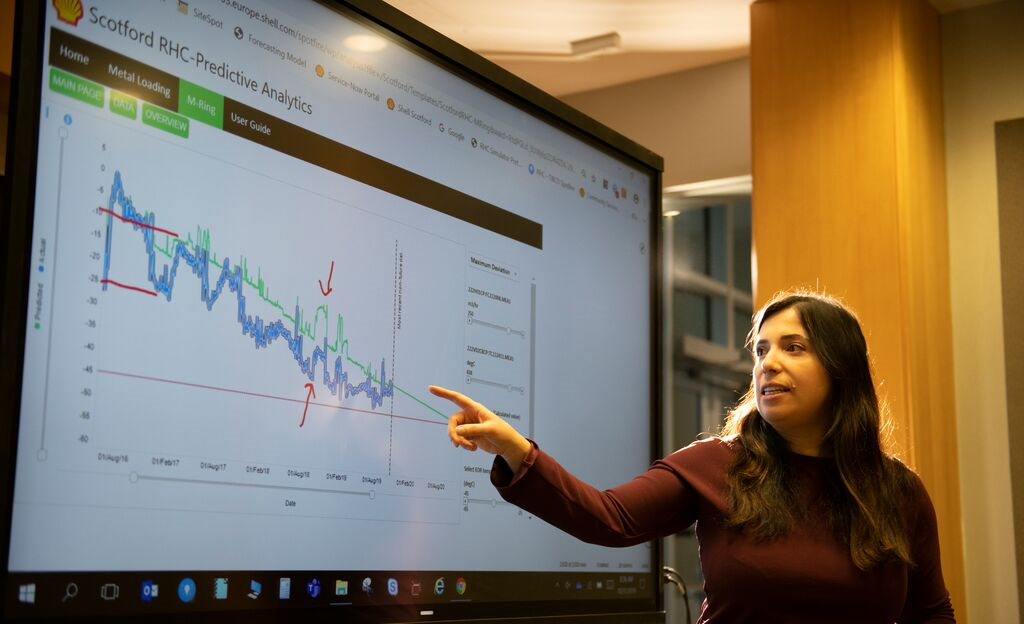< Back to insights
Published 01. Sep. 2021
Marco Hoppenbrouwer: Fueling Growth Through Data-Driven Culture
Data-driven culture will be the key factor in determining growth and Marco Hoppenbrouwer dives into the role of data in modern organizations.
With remote work expected to become a mainstay in the foreseeable future, IT and business leaders are looking at new ways to ensure that their employees are equipped with the necessary critical insights needed to make business decisions.
One of the key approaches is to develop a data-driven culture: the utilization of emerging technologies to drive business value, pushing an organization to be insight-driven as opposed to gut-feeling and operating in the dark.
Marco Hoppenbrouwer, Chief Data Officer for Global Functions & Finance at Shell, understands the value of data to drive value for businesses in today’s modern landscape. In this interview, Hoppenbrouwer shares his insights on how the chief data officer (CDO) role has evolved and why data-driven culture is a necessity for corporations
The Power of Digital and Data and The CDO’s Role
To compete in an age of rapid acceleration, companies need to be data-driven, but the transition from a feeling- to a fact-based organization is not an easy path. With only 24% of companies truly fostering data-driven cultures, it is up to the CDO to push the initiative of cultivating data technology in a business.
However, before CDOs can achieve that, Hoppenbrouwer points out why the components of Digital and Data are important for a business and what the focus needs to be for CDOs to streamline the transition towards a fact-based organization.
How has the role of the chief data officer (CDO) evolved in today’s data-driven culture?
Let me first set the scene as to why digital and data are so important for any business and one cannot do without the other:
The energy transition and digitalization are two mega-trends that affect the world in the coming decades. Both are expected to have a profound impact on the way everyone lives their lives.
Digital technologies can play a key role in the transition to a lower-carbon future. Furthermore, we see a rapid increase in digital products, services, and processes coupled with the increasing expectations for a seamless digital experience from both our customers and employees.
Digital is not new, but what’s different is the availability of technology, data, and capabilities that are growing at an exponential rate. Digital is also one of the few processes that require quality data as input to be successful.

I’ve seen projects fail because a Proof of Concept was successful as it was run on manipulated datasets but this was not the reality in the field when the solution was to be deployed.
Maximizing the benefits of digital technology is heavily dependent on the readiness of an organization and its workforce, meaning:
- It is key to upskill the workforce with new tech skills
- The entire organization needs to be data-savvy
This also means that if the organization cannot keep up, it will rapidly be taken over by a competitor that leverages digital technologies and can deliver a more compelling value proposition faster and at a lower price point. A good example of digital disruption is SpaceX that disrupted the entire launch industry.
As to how this answers your question, the role of the CDO has changed from an information & compliance management role into a strategic value generator role. With digitalization and the emergence of the CDO, data is now at the forefront and is seen as a key-value driver that drives business outcomes.
What role should the CDO play in streamlining the transition to a fact-based organization?
There are three key areas the CDO should focus on:
- Accelerate digitalization and driving business value from data, meaning:
- CDO knows how data enables the business strategy and what value it can drive
- CDO knows what data is needed, who owns it, where it’s mastered, whether it can be trusted and how it can be accessed
- CDO formalizes roles & responsibilities for Data Management
- Increasing organization’s data literacy so that:
- employees understand the importance and their role in data management, including data quality beyond their line of business. For example: if the quality of data you create is not good enough for downstream usage by another line of business, you create a problem in the value chain.
- employees have the technical skills to drive value from data through citizen developer tools such as the Microsoft Power Platform. This can be achieved through developing role-based learning paths, setting up a community of practices for sharing key data-related best practices, running DIY boot camps or Hackathons.
- The CDO should strive for data-based decision making by ensuring that the required analytics & insights are timely available in the decision-making process
Eyeing The Potential and Opportunities of Data-Driven Culture
The field of data analytics has consistently grown, in terms of acceptance and importance, and will play a critical role as a decision-making resource for executives in modern companies.
Gartner predicts that by 2024, at least 30% of organizations will invest in data and analytics platforms, increasing their business impact for trusted insights and encouraging new efficiencies. As such, CDOs must take initiative in fostering data technology as an organizational asset for digital transformation.
But, what are the challenges and how should CDOs approach this transition?
Hoppenbrouwer delves into the main points of how the CDOs should facilitate the data strategy for an organization, and the perspective needed to overcome the challenges of digitalization in a post-pandemic market.
With data having the potential to transform functions into a high business impact model, what initiatives should the CDO take to help this transition?
Ensure that there is a data strategy for each line of business. This helps pave a clear roadmap for the usage of data, the business value it enables, and the capabilities required to deliver this value.
Secondly, businesses will need to get the data into good shape, meaning:
- Identify data ownership and resolve where ownership is unclear
- Identify the data that matters, which means not all data, only the critical data
- Make data issues transparent, such as data quality & remediation or master data management & replication
- Embedding of data quality management in daily operations for data that matters
- Drive fit for purpose improvements
Lastly, there needs to be a focus on upskilling the employees on data skills.
Are there challenges for the adoption of data technology skills and culture? How has the pandemic affected these challenges?
There are many challenges and plans that have been impacted, but I prefer to look at the opportunities.
I am heading our European Data & Analytics community and normally we hold local and focused events on specific data topics. These can be lunch & learn or deep dives on how to start on the AI journey, sharing best practices from a recent analytics project, etc.

Due to the pandemic, we organized virtual sessions. These events offer the opportunity for staff to virtually meet other colleagues outside their daily routines and join with D&A communities in larger events across the organization, such as data literacy programmes or DIY boot camps.
At the same time, the pandemic has accelerated the business’ digitalization plans, putting much more emphasis on data enablement. As result, it has increased the need for Data, Data Strategy, Data Governance, Data Quality, Data Skills, and Data Capabilities in the organization.
People At The Core of Data and Digitalization
The explosion of available data has given corporations the potential to fuel a new era of fact-based innovation and new ideas through solid evidence. All this culminates in improving operations, clear strategies, and better ways to satisfy customers.
Yet for many organizations, a strong data-driven culture still remains elusive with data rarely being the foundation for decision making.
What makes it hard for corporations to be data-driven?
The answer lies beyond data technology. It is about kickstarting the culture at the very top through leadership that sets expectations and decisions anchored in data. The lack of data awareness is something that Hoppenbrouwer believes is one of the major pitfalls for those in leadership roles.
Not all employees are not sufficiently aware of the importance of data for the organization. People have learned to store certain data, but they are not really sure why this is important and what other departments do with it.
As a result, data provided by one department to another is often incomplete or contains errors on more than one. Supplementing or correcting this leads to additional work and additional costs. It’s key for employees to understand the data value chain and the role they play in it.
What pitfalls should the CDO be aware of when pursuing a data-driven culture?
Culture is made out of people, and changing a culture means you need to get a change going with the people. People don’t change naturally unless there is a reason to do so.
Everybody wants to deliver their digitalization strategy due to the value it enables and this is a key catalyst to improve data culture.
However, data is a foundational enabler, and data responsibilities were considered an add-on to the day job without recognition for good performance for data-related activity.
Leadership needs to change here and need to step up, from the top, all the way to the supervisors on the shop floor.
What can the leadership do to make these changes? Some examples include:
- Publicly speaking about the role and importance of data
- Clearly articulate how data enables the business strategy and the value it unlocks
- Data roles & responsibilities need to be formalized AND effort recognized
- Visibly recognizing the good work done in the organization to get the data right
- Sharing of success stories and lessons learned
- Encouraging staff to become more data literate, through sponsoring data literacy events, citizen data science boot camps, and inclusion in personal development plans
Ultimately, the CDO plays a key role here in supporting the leadership to drive a change through the organization.
